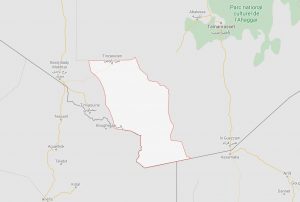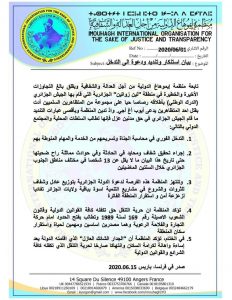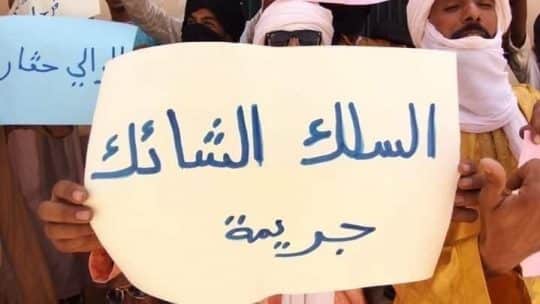Tin Zawatin sits at the Algerian-Malian border, sharing in part a border with Niger as well, about 550 km south-west of the wilaya of Tamanghasset. On Monday, June 15, videos of intense interaction between military personnel and locals circulated social media, one of which show a man lying on the floor behind two gendarmes. Sounds of gunfire can be heard. Photographs of injury can be seen.
Security measures are part of border protection, concerning both the circulation of items and the movement of people in this vulnerable zone, but elected officials at the border are demanding that such procedures are done with the local Algerian populations in mind.
[ads1]
Demonstrations recently took place in Timiawin where inhabitants demanded access to drinking water. Representatives of the Timiawin commune openly challenged the President of the Republic in front of the daira tribunal on the difficulties that these marginalized communities face. 1000 liters of water costs 1500 DA, an unmanageable price for locals.

On June 10, residents of Tin Zawatin protested against the barbed wire fence. On June 11, representatives of the civil society addressed the wali of Tamanghasset in a formal note with a list of complaints, the barbed wire around the wadi being one of them. They asked for the reconstruction of a wall with a means of passing through and clearing the way for farmers and pastoralists in non-urbanized areas. The letter also brings up a need for better communication between local notables and security forces in order to maintain peace in the region.
Akram Kharief, Sahel specialist, told Maghreb Element, “We set up levees, sand walls and barbed wire to avoid the infiltration of terrorist groups and to avoid them from possible suicide bombings that could occur. In the case of Tin Zawatin, the barbed wire has isolated the populations of the wadi, according to testimony.” Kharief believes that these buffer zones should take the views locals have on movement, water, and livestock into account. The barbed wire was placed at a certain distance from the border, on Algerian territory, and compromised the land on which the inhabitants use for agriculture. The wadi is barren for most of the year, but is filled with water in the months of July and August. In the summer, it is vital for families.
An ex-military chief explains that, using military logic, the wadi is a natural barrier one ought to leave behind, forcing potential threats to cross before reaching you. From this point of view, the establishment of the defense line on the northern bank of the wadi in Tin Zawatin is an imperative combat strategy for military leadership. Residential areas adjacent to the border are targeted by terrorists because they are their preferred means of infiltrating and hitting military sites. A suicide attack killed a guerrilla soldier in the Tin Zawatin region in February. That being said, this locality is in a destitute state despite promises of development, forcing local populations to be reliant on livestock. The ex-military chief states that the interests of the people and of national security have to be in harmony.
On the other hand, those who caught wind of this news have also said barbed wire has never stopped a terrorist before. Locals contest that the barbed wire should have been situated by the administrative border, and not where it would cut off populations by the wadi. A group of people torn down the barrier. The GGF (Border Gard) and later the GIR intervened. In a video we see that the gendarmes shot fire in the air, and not directly at protesters, likely to incite fear and make people move away from the torn-down wire.
[ads1]
The National Ministry of Defense (MDN) confirms a gunshot death but denies that Algerian security forces were involved in the incident. The fatality took place 225 m away from the Malian border, a complicated location and distance for it to be caused by a precise shot. There is a possibility, according to Kharief, that it was the result of a lost bullet. In any case, the victim was north of where the gendarmes opening fire were.
Many are accusing the National People’s Army for having opened fire on individuals in Ikhraben, bordering the municipality of Tin Zawatin in the 6th Military Region. All allegations have been formally denied. The MDN claims these events to be linked to persons known for suspicious activities in contraband and organized crime. According to the MDN in their press release, these nationals in question called locals to violence and had an aim of taking down the barbed wire.
The MDN explains that at the time when the Algerian Border Guard intervened to appease the situation, unknown shots were fired from Ikhraben in the direction of the Border Guard, having hit an individual among the crowd, “who was immediately evacuated by the border guards to be taken care of by the health services, but who unfortunately died from his injuries.” To this end, the High Command of the National People’s Army “has ordered the opening of an investigation to elucidate the circumstances of this incident,” and calls “for vigilance regarding these kind of rumors and misinformation, used by hostile parties, aiming to disrupt the situation in this region.” The wounded individuals were transported to Tamanghasset.
Last March, and on the occasion of the death of a young man killed by the police while he was aboard his vehicle, seven deputies from the wilayas of Tamanghasset, Illizi and Adrar had sent a protest letter to the Prime Minister A. Djerad. Boudjemaa Balaou, elected official of the APW in Tamanghasset, released a video testimony mentioning this. They had called for better regulation of areas closed by barbed wire, a passage for farmers and ranchers, water, better procedures enacted by security authorities, and finally local development.
[ads1]
In 2018, authorities created a “special development program” for these areas. According to Lyas Hallas, the amenokal (community leader) of the Hoggar region in Tamanghasset, Idabir Ahmed, said, “I condemn these unjustified behaviors in the Tin Zawatin region.” He advised the population of Tamanghasset, and residents of Tin Zawatin in particular, to practice self-restraint and discretion. “I am in contact with the country’s highest authorities, in order to find a final solution to such abuses in the border areas.”
Imouhagh International Organization for the Sake of Justice and Transparency released this document:

Balaou recalled that in previous events in border areas, authorities had called for dialogue with local notables. That is no longer enough for the inhabitants.

